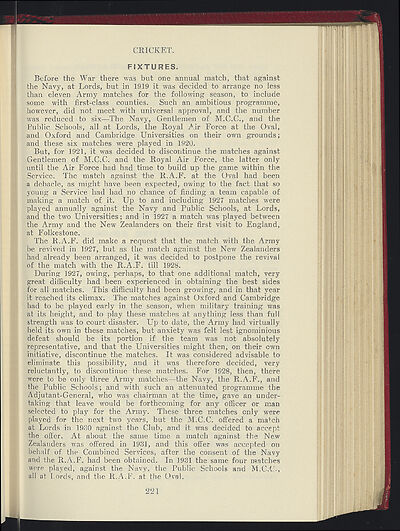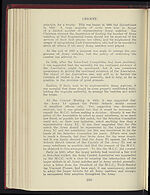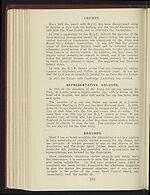1935-36
(263)
Download files
Complete book:
Individual page:
Thumbnail gallery: Grid view | List view

CRICKET.
FIXTURES.
Before the War there was but one annual match, that against
the Navy, at Lords, but in 1919 it was decided to arrange no less
than eleven Army matches for the following season, to include
some with first-class counties. Such an ambitious programme,
however, did not meet with universal approval, and the number
was reduced to six—The Navy, Gentlemen of M.C.C., and the
Public Schools, all at Lords, the Royal Air Force at the Oval,
and Oxford and Cambridge Universities on their own grounds;
and these six matches were played in 1920.
But, for
1921,
it was decided to discontinue the matches against
Gentlemen of M.C.C. and the Royal Air Force, the latter only
until the Air Force had had time to build up the game within the
Service. The match against the R.A.F. at the Oval had been
a debacle, as might have been expected, owing to the fact that so
young a Service had had no chance of finding a team capable of
making a match of it. Up to and including
1927
matches were
played annually against the Navy and Public Schools, at Lords,
and the two Universities; and in
1927
a match was played between
the Army and the New Zealanders on their first visit to England,
at Folkestone.
The R.A.F. did make a request that the match with the Army
be revived in
1927,
but as the match against the New Zealanders
had already been arranged, it was decided to postpone the revival
of the match with the R.A.F. till
1928.
During
1927,
owing, perhaps, to that one additional match, very
great difficulty had been experienced in obtaining the best sides
for all matches. This difficulty had been growing, and in that year
it reached its climax. The matches against Oxford and Cambridge
had to be played early in the season, when military training was
at its height, and to play these matches at anything less than full
strength was to court disaster. Up to date, the Army had virtually
held its own in these matches, but anxiety was felt lest ignominious
defeat should be its portion if the team was not absolutely
representative, and that the Universities might then, on their ewn
initiative, discontinue the matches. It was considered advisable to
eliminate this possibility, and it was therefore decided, very
reluctantly, to discontinue these matches. For
1928,
then, there
were to be only three Army matches—the Navy, the R.A.F., and
the Public Schools; and with such an attenuated programme the
Adjutant-General, who was chairman at the time, gave an under-
taking that leave would be forthcoming for any officer or man
selected to play for the Army. These three matches only were
played for the next two years, but the M.C.C. offered a match
at Lords in
1930
against the Club, and it was decided to accept
the offer. At about the same time a match against the New
Zealanders was offered in
1931,
and this offer was accepted on
belialf of the Combined Services, after the consent of the Navy
and the R.A.F. had been obtained. In
1931
the same four matches
were played, against the Navy, the Public: Schools and M.C.C.,
all at I.ords, and the R.A.F. at the Oval.
221
FIXTURES.
Before the War there was but one annual match, that against
the Navy, at Lords, but in 1919 it was decided to arrange no less
than eleven Army matches for the following season, to include
some with first-class counties. Such an ambitious programme,
however, did not meet with universal approval, and the number
was reduced to six—The Navy, Gentlemen of M.C.C., and the
Public Schools, all at Lords, the Royal Air Force at the Oval,
and Oxford and Cambridge Universities on their own grounds;
and these six matches were played in 1920.
But, for
1921,
it was decided to discontinue the matches against
Gentlemen of M.C.C. and the Royal Air Force, the latter only
until the Air Force had had time to build up the game within the
Service. The match against the R.A.F. at the Oval had been
a debacle, as might have been expected, owing to the fact that so
young a Service had had no chance of finding a team capable of
making a match of it. Up to and including
1927
matches were
played annually against the Navy and Public Schools, at Lords,
and the two Universities; and in
1927
a match was played between
the Army and the New Zealanders on their first visit to England,
at Folkestone.
The R.A.F. did make a request that the match with the Army
be revived in
1927,
but as the match against the New Zealanders
had already been arranged, it was decided to postpone the revival
of the match with the R.A.F. till
1928.
During
1927,
owing, perhaps, to that one additional match, very
great difficulty had been experienced in obtaining the best sides
for all matches. This difficulty had been growing, and in that year
it reached its climax. The matches against Oxford and Cambridge
had to be played early in the season, when military training was
at its height, and to play these matches at anything less than full
strength was to court disaster. Up to date, the Army had virtually
held its own in these matches, but anxiety was felt lest ignominious
defeat should be its portion if the team was not absolutely
representative, and that the Universities might then, on their ewn
initiative, discontinue the matches. It was considered advisable to
eliminate this possibility, and it was therefore decided, very
reluctantly, to discontinue these matches. For
1928,
then, there
were to be only three Army matches—the Navy, the R.A.F., and
the Public Schools; and with such an attenuated programme the
Adjutant-General, who was chairman at the time, gave an under-
taking that leave would be forthcoming for any officer or man
selected to play for the Army. These three matches only were
played for the next two years, but the M.C.C. offered a match
at Lords in
1930
against the Club, and it was decided to accept
the offer. At about the same time a match against the New
Zealanders was offered in
1931,
and this offer was accepted on
belialf of the Combined Services, after the consent of the Navy
and the R.A.F. had been obtained. In
1931
the same four matches
were played, against the Navy, the Public: Schools and M.C.C.,
all at I.ords, and the R.A.F. at the Oval.
221
Set display mode to:
![]() Universal Viewer |
Universal Viewer | ![]() Mirador |
Large image | Transcription
Mirador |
Large image | Transcription
| Games and sports in the army > 1935-36 > (263) |
|---|
| Permanent URL | https://digital.nls.uk/248711789 |
|---|
| Description | 'Games and Sports in the Army' was an annual publication produced by the British War Office between the 1930s and 1960s. This included the Second World War. It outlines the rules and regulations for games and sports played by members of the armed forces. It features names and photographs of team members, and examples of contemporary advertising. |
|---|---|
| Shelfmark | GWB.52 |

